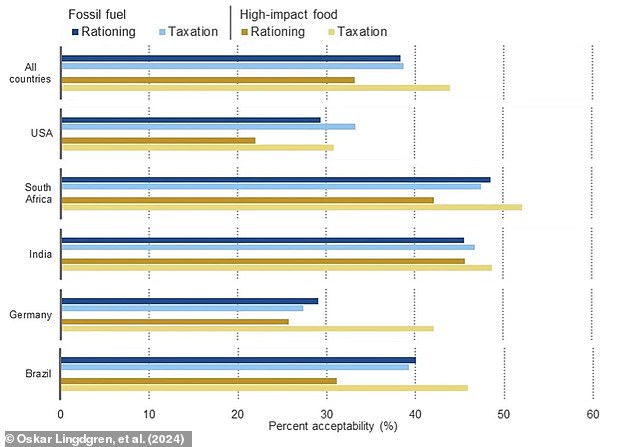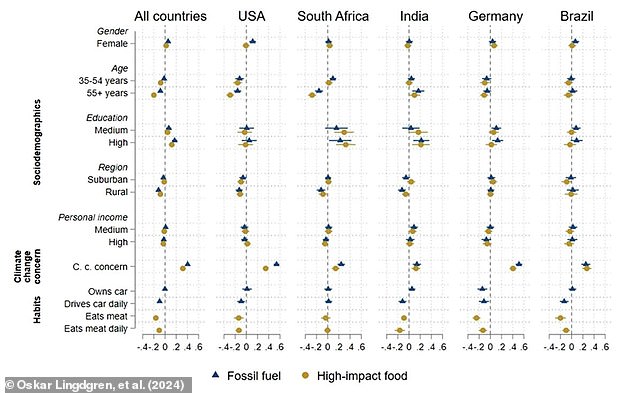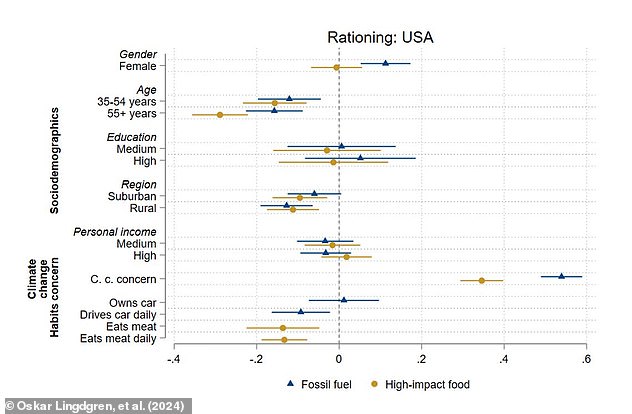After the end of World War II, it took Britain almost a decade to finally abolish rationing of everyday goods.
While the war may have occurred almost 80 years ago, almost 40 percent of the public would now welcome the ration book to help fight climate change.
Researchers from Uppsala University, Sweden, surveyed nearly 9,000 participants from India, Brazil, Germany and the United States.
Their responses revealed that rationing fuel and “emission-intensive” products such as meat is almost as widely accepted as raising taxes.
Lead author Oskar Lindgren, a PhD student at Uppsala University, says: “Rationing may seem dramatic, but so is climate change. This may explain why support is quite high.”
Nearly 40 percent of people would agree to return to World War II-style fuel and meat rationing to combat climate change, according to a new study. In the photo: ration booklet from the Ministry of Food from the last years of rationing.

A survey of nearly 9,000 people on five continents found that support for rationing was very similar to support for higher taxes on fuel and meat.
If the world is to achieve the climate change goals set out in the Paris Agreement, governments around the world will need to take action to reduce the consumption of carbon-intensive products such as fossil fuels.
Currently, most governments and researchers focus on “economic instruments” such as taxing polluting products and subsidizing greener alternatives.
However, scientists believe that a fairer alternative could be to limit the amount of these goods that can be purchased.
Mr Lindgren says: “One advantage of rationing is that it can be perceived as fair, if it is made independent of income.”
As in World War II, rationing ensures that everyone receives an equal share of limited resources, regardless of their economic status.

As this graph shows, the researchers found that gender and income only had a small effect on whether people supported the policy. The most important factors included how concerned people were about the environment and whether they drove a car daily.
In total, 8,654 people from five continents were interviewed to compare the acceptability of rationing with the acceptability of taxes.
Each participant was asked to rate the policies on a scale of one to five, with one being strongly against and five being strongly in favor.
Overall, 38 percent of respondents said they would accept monthly limits on fuel purchases compared to 39 percent who said they would accept higher fuel taxes.
Similarly, 33 percent of people said they would support monthly limits on meat purchases compared to 44 percent who said they would support a higher tax on high-climate-impact foods.
Around the world, some forms of rationing are widely used to mitigate or limit the impacts of climate change.

Support for meat rationing was lower in the United States and Germany than in South Africa and India, where the measure received broad support (file image)
Researchers note that in some Chinese cities, driving is rationed allowing drivers to use the roads only on certain days as part of a plan to reduce pollution.
Likewise, fishing quotas ration the amount of fish that fleets can catch in protected areas of the ocean.
Even in the UK, banning the use of hoses during droughts is a commonly used form of water rationing that helps mitigate the impacts of increasingly frequent and severe heatwaves.
However, researchers had not anticipated that broader rationing of food and fuel would receive support comparable to the tax increase.
Co-author Dr Mikael Karlsson, also from Uppsala University, says: “The most surprising thing is that there is hardly any difference in the acceptability between rationing and taxes on fossil fuels.”

Researchers point out that in some Chinese cities like Beijing (pictured) fuel use is already rationed indirectly by preventing people from driving on specific days. This aims to help reduce air pollution within the city.

In the United States, women were significantly more likely to support fuel rationing, while people who expressed concern about the environment were the most likely to support any form of rationing.
The proportion of people who supported or opposed taxes and rationing varied between countries; low- and middle-income countries were generally more supportive of rationing.
Of the South African participants, 49 percent accepted some form of rationing, while 46 percent of the Indian participants would.
Meanwhile, support for rationing was only 29 percent in both the United States and Germany.
Similarly, people were more likely to support rationing if they were more concerned about environmental issues.
However, the researchers also found that taxes on fuel and food could be an even more unpopular alternative.
Dr. Karlsson says: “In Germany, the proportion of people who strongly oppose taxes on fossil fuels is actually higher than the proportion who strongly oppose rationing of fossil fuels.”
In the United States, 28 percent of the population also said they strongly opposed rationing of meat or fuel as a means to combat climate change.
Despite some opposition, researchers insist that rationing could be a viable alternative to raising taxes.
Mr Lindgren added: “More research is now needed into attitudes towards rationing and the design of such policy instruments.
‘Many people seem willing to limit their consumption for climate mitigation purposes, as long as others do the same. These are encouraging findings.”

